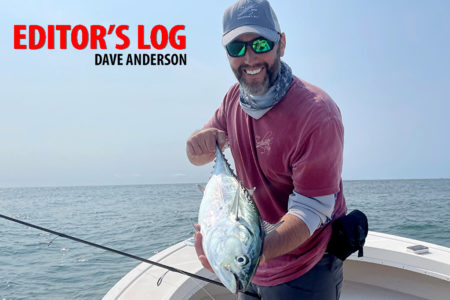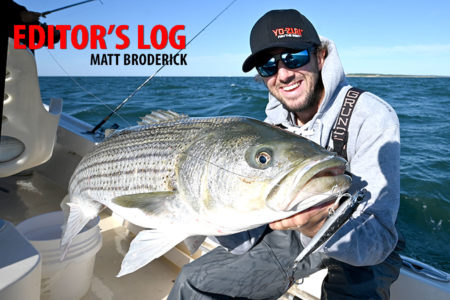I recently came across the January 2020 edition of Wildlife Highlights issued by the Connecticut Department of Environmental Protection (DEEP). Amid news stories of the state’s bald eagle population and hunter education opportunities, an item relating to striped bass poaching immediately caught my eye. In short, a legislative proposal was recently made in Connecticut to change what Environmental Conservation (EnCon) Police Officers are allowed to issue when encountering striped bass violations in the field. (See below)
Proposal for Striped Bass Enforcement
The DEEP has proposed legislation to enhance enforcement of striped bass sport fishing regulations. Under current State law, Environmental Conservation (EnCon) Police Officers can write tickets (infractions) for any sport fishing violation, with the exception of striped bass violations, for which the only option is to issue a misdemeanor summons. If found guilty, the violator faces heavier fines than for other sport fishing violations.
Unfortunately, due to the overburdened nature of the State’s courts, existing laws are not having the desired effect. Prosecutors routinely decline to prosecute (nolle prosequi) fishing-related misdemeanors. Additionally, a misdemeanor case requires substantial time and effort on the part of DEEP EnCon Officers, making it all the more frustrating when such cases are dismissed. The Environmental Conservation Police Division and DEEP Marine Fisheries Program agree that allowing officers to write tickets for striped bass sport fishing violations would actually provide more effective deterrence against poaching. The new legislative proposal would provide that ability by converting hundreds of written warnings into tickets and paid fines and, over time, would likely translate to reduced striped bass poaching. This change is urgently needed given the recent finding by the Atlantic States Marine Fisheries Commission (ASMFC) that the Atlantic striped bass stock is overfished and in need of enhanced conservation.
I was not aware of this, but apparently with other species of fish EnCon Officers in Connecticut may issue a ticket to offenders at the moment of intercept, but with striped bass they must issue a misdemeanor summons. At first glance this seems like a positive course of action as a misdemeanor summons carries with it stiffer penalties, especially when considering the current status of the striped bass stock in that we should be doing all that we can to curb illegal harvest. However, there is a major problem in how it shakes out as the court system—not just in Connecticut—generally doesn’t look harshly upon fisheries violations. Quite often the judge presiding over the case has such items as drug charges, violent crimes and the like on the docket the same day he or she is hearing a fisheries violation. One can almost not blame them for considering the act of “keeping a fish or two over the limit” rather minor of an infraction in comparison to someone who was caught with an excessive amount of a controlled substance for example, but we as fishermen know otherwise.
Further, quite often as noted in the above press release, prosecutors routinely decline to prosecute these fishing-related misdemeanors. This means that all of the taxpayer money and EnCon officers’ time—both of which could have been better spent in the field—are essentially wasted. This undoubtedly results in far more warnings being issued to offenders, the equivalent of less than a slap on the wrist, to the vast majority of poachers. It also means that violations become harsher for infractions relating to other fish species than for that of striped bass, which is in direct opposition to the original intent of breaking out striped bass. I can only imagine the frustration being felt by each and every EnCon Officer out there at this conundrum.
To combat this problem, the proposal would put striped bass violations in line with other species of fish and a ticket could be issued for offenses. This means that the per-offense penalty would go down, but the total number of annual tickets issued would increase dramatically therefore resulting, in theory, in a more efficient reduction in poaching. All of those warnings being issued before, and there are plenty to be had thanks in no small part to the abundance of small fish wintering over in the tidal rivers of Connecticut, would now become tickets with set fines. Failure to pay said fine would result in punishment as with other tickets.
So perhaps this is the best way to address the rampant poaching that seems to be going on these days. Well, that is, until an environmental-specific court system is established to handle all items relating to fishing, hunting and all related cases to be presided over by judges who are extensively familiar with the laws and related concerns, but I’m not holding my breath for that to happen anytime soon.
Again, at this time this is only proposed legislation. The governor will submit budget recommendations with legislative proposals in February, so I’ll be sure to monitor its status and report back as updates become available.


